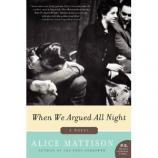Reading Group Guide
Discussion Questions
When We Argued All Night

1.The title When We Argued All Night tells us right from the start that this book is about people who don’t always get along. What is the relationship between argument and love in this novel? Is Harold and Artie’s friendship stronger or less strong because they argue? Artie is particularly disagreeable. Can you love him anyway?
2.Talking about Henry James’s novel The Portrait of a Lady, Harold and Myra disagree about the final scene, in which Isabel Archer goes back to her evil husband even though she could get away. Harold says James means her to be heroic, or else there’s no reason for it to be the end of the book: the final act is her achievement, what she accomplishes. Myra says “What does anyone accomplish?” and that question titles the first six chapters of the book. What is accomplishment in this novel? For Artie? For Harold? For Brenda?
3. The first chapter is entitled “The Whistler.” What does music mean to Artie? Photography?
4. World events affect the lives of these characters at least as much as their personal histories. How do events and attitudes in the society around them influence Harold’s membership in the Communist Party and his disillusionment with it? Harold and Artie’s teaching careers? Brenda’s willingness to consider that she might be gay?
5. Toward the end of the book, Brenda’s son David becomes a writer, choosing to write nonfiction because he wants to recount the real events in his life, even though they are not dramatic. He goes to graduate school to learn how to convey his strong feelings without inventing exciting events. Must fiction exaggerate life to make the reader care? What makes writing—fiction, nonfiction, or poetry—affect a reader if it is about people to whom nothing much happens? Do quiet events in fiction speak to you as much as exciting ones?
6. Late in his life Harold tells David that he regrets nothing, because each part of his life, even the parts he has been ashamed of, has led to something he cherishes. Is that a convincing argument? Harold is always aware of the wish to be a good person—but is he a good person? What about Artie, who rarely thinks in those terms?
7. What is the meaning of the cabin in the Adirondacks for the characters in this novel?
8. Nelson is a significant figure in this novel, especially for Harold and Brenda. What do you think of Brenda’s decision to drive Nelson to the bridge, and her subsequent actions there? Is Harold a good father to Nelson—or is that an unfair question?
9. Harold and Artie both lose their jobs as a result of McCarthyism, but the effect of this difficult event on each of their lives is quite different. Is this just chance? How is it consistent with their earlier lives?
10. Neither Harold nor Artie is an observant Jew, but being Jewish matters to both of them. How does Jewishness play out in their lives? What makes them feel Jewish? As the children of immigrants, how are they like or unlike Jews who are several generations removed from the old country? What do they have in common with the children of immigrants from other ethnic groups?
When We Argued All Night
- Publication Date: June 12, 2012
- Genres: Fiction
- Paperback: 416 pages
- Publisher: Harper Perennial
- ISBN-10: 0062120379
- ISBN-13: 9780062120373








